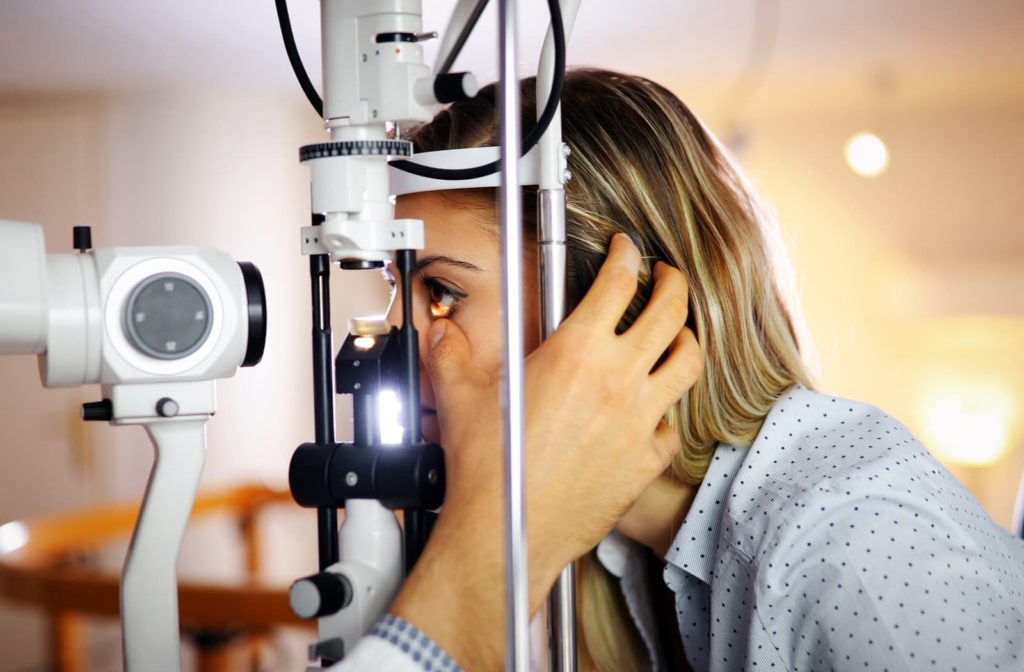
As we age, many of us will begin to experience vision problems. However, there are signs of trouble you can look out for, and mention to your optometrist during your next annual eye exam.
Symptoms You Can Watch For At Any Age
Your Range of Focus Changes
As we age, many of us will find that focusing on near objects becomes more difficult: a condition called presbyopia. This condition can be managed using glasses or contact lenses or corrected using laser eye surgery.
Your Eyes Twitch Frequently
Though fatigue, stress, eye strain, and excessive caffeine and alcohol consumption can cause our eyes to twitch, this condition can also be a side effect of some eye conditions. If you are experiencing unexplained eye twitches, please speak to your optometrist.
You Get a Lot of Headaches
Eye strain can lead to headaches, and research suggests that it could also increase your chances of developing glaucoma. If you are experiencing frequent, unexplained headaches, please speak to your optometrist and your family doctor.
You See Halos & Have Blurry Vision
Seeing halos around objects may indicate a vision problem is forming and may be a symptom of a serious condition or disease such as:
Good Habits to Adopt
Establish Healthy Digital Device Habits
You can help reduce eye strain by avoiding long periods of uninterrupted screen time and remembering to take regular breaks. Make sure you also remember to blink frequently.
Here are a few other healthy habits to follow:
- Keep screens at arm’s length, and below eye level, if you’re holding your head straight.
- Set colours and contrast tones to match the brightness of your surroundings.
- Avoid glare, and don’t sit in direct sunlight when looking at a screen.
- Keep your screen clean and free from dust or smudges.
- Use the 20-20-20 rule: for every 20 minutes of screen use, relax and look at something 20 feet away for 20 seconds.
Get a Baseline on Your Eye Health
While there may be no sense worrying if nothing is wrong, how do you know your eyes are alright? Annual eye exams can help you ensure your eyes are happy and healthy by giving your optometrist to detect and diagnose problems early on.
Though we can all benefit from annual exams, patients with preexisting vision problems or systematic conditions such as diabetes are more likely to develop serious eye conditions and therefore need to be extra vigilant about going for regular exams.
Keys to Maintaining Your Eye Health

Go For Annual Checkups
We recommend most patients have their eyes examined at least once per year. These annual exams let your optometrist track and monitor any changes in your eye health or vision, and ensure your prescription is up to date. However, if you are ever concerned about your vision or eye health, you should book an exam right away, even if you aren’t due for one yet.
Eat a Healthy Diet
Congenital diseases and conditions can become worse with age. Make sure you are aware of any family history of eye disease so you can take appropriate prevention steps. For example, eating lots of foods that contain important nutrients such as vitamin C, vitamin E, lutein, zeaxanthin, zinc, and copper can help prevent age-related macular degeneration.
Give Your Eyes a Break
Make sure you are taking regular breaks (and following the 20-20-20 rule like we mentioned above) so that your eyes have a chance to rest. If your eyes ever begin to feel tired or you are having trouble focusing your vision, you should take a break right away.
Go for Regular Eye Exams
Even if you adopt all the healthy habits listed above, none of them are a replacement for regular eye exams. If you do develop an issue with your sight or eye health, your optometrist can give you an accurate diagnosis and provide you with a treatment or management plan tailored to your unique needs.


